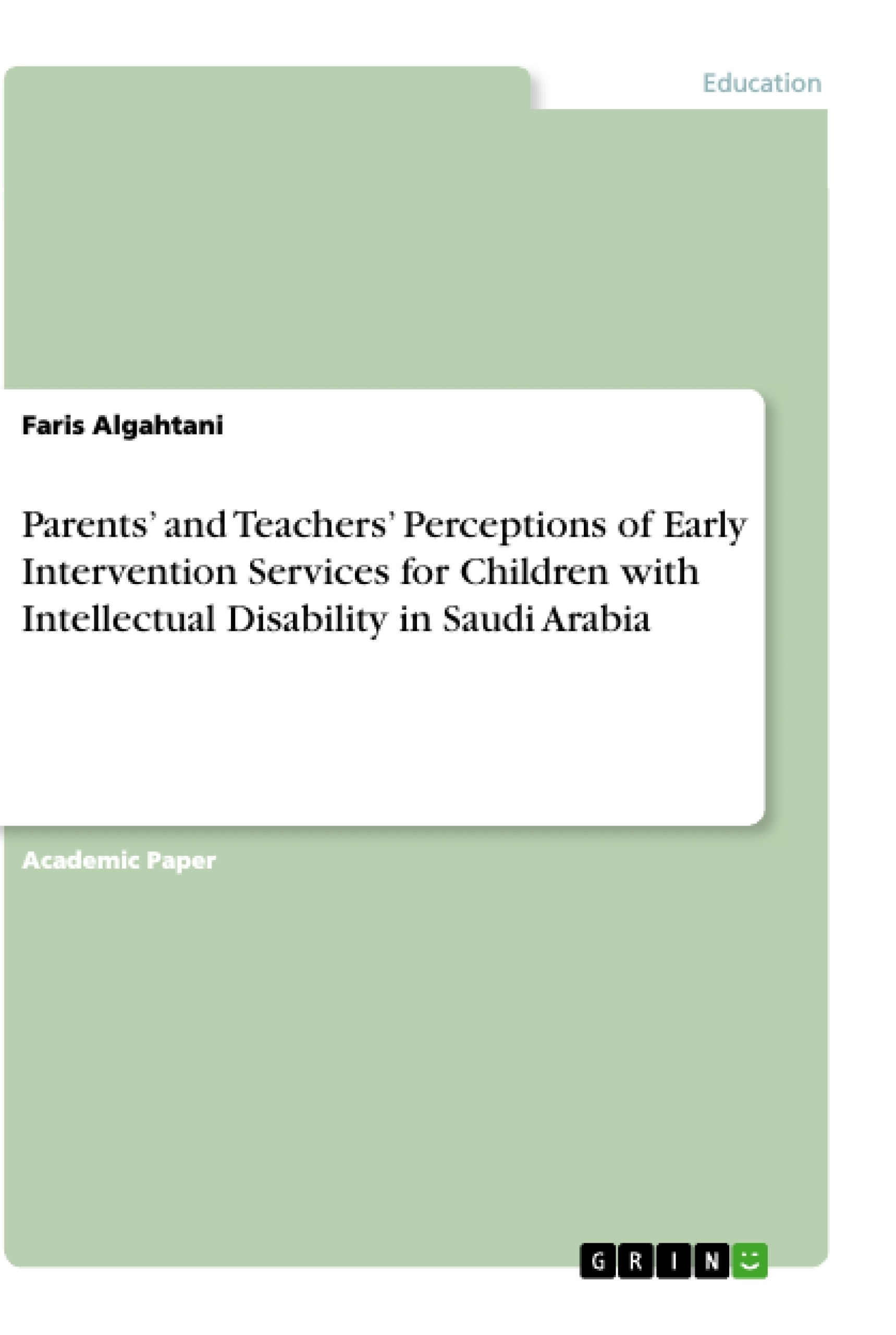One of the serious goals of the ministry of Education of the Kingdom of Saudi Arabia is to have an all-inclusive system that takes care of the needs of disabled children. The reason behind this is that the disability is one of the most-potent educational marginalization factors yet can come out as the least evident to the view of the stakeholders. It is tricky to handle because the stigmatization effect tends to lower the self-esteem of the disabled children. Disability does not only relate to impairment physically but also encompasses shortage of capability mentally; cognitive, emotional and psychologically such that society finds it hard to incorporate such individuals in the normal operation routines.
Inhaltsverzeichnis (Table of Contents)
- 1. Theoretical Framework
- 1.1 Introduction
- 1.2 Disability
- 1.3 Disability Among the Families
- 1.4 Early Intervention
- 1.5 Parents Experience and Early Intervention Process
- 1.6 How Early Intervention Addresses Individuals and their Environment
- 1.7 Early Education Addressing Learning Disability
- 1.8 Education Programs for Children with Disabilities
- 1.9 Overview of Saudi Arabia
- 1.9.1 Geography and Population
- 1.9.2 Education System in Saudi Arabia
- 1.10 Disability in Kingdom of Saudi Arabia
- 1.11 Brief History: Overview of Saudi Welfare about Disability
- 1.12 Overview of Non-Governmental Organization Sectors and Services
- 1.13 Policy Issues on Disability in Saudi Arabia
- 1.14 Early Intervention in Saudi Arabia
- 1.15 Purpose of the Study
- 1.16 Research Questions
- 2. Methodology
- 2.1 Introduction
- 2.2 Research Strategy
- 2.3 Realist Ethnography
- 2.4 Critical Ethnography
- 2.5 Participative Ethnography
- 2.6 Research Approach
- 2.6.1 Qualitative Research Approach
- 2.7 Research Design
- 2.7.1 Inductive and Deductive
- 2.8 Types of Sampling
- 2.9 Participants and Procedure
- 2.10 Data Collection
- 2.11 Types of Date Collection
- 2.12 Interview Data Collection
- 2.13 Types of Interviews
- 2.13.1 Semi-Structured Interviews
- 2.13.2 Face-to-Face Interviews
- 2.14 Data Analysis
- 2.15 Limitation of the Study
- 2.16 Ethical Issues
- 2.17 Time Table
Zielsetzung und Themenschwerpunkte (Objectives and Key Themes)
This research aims to explore the perspectives of parents and teachers regarding early intervention services for children with intellectual disability in Saudi Arabia. The study seeks to understand the challenges and opportunities associated with these services and to provide recommendations for improvement.
- The impact of disability on families and the educational system in Saudi Arabia.
- The effectiveness of early intervention programs in addressing the needs of children with intellectual disabilities.
- The role of parents and teachers in supporting the successful implementation of early intervention services.
- The challenges and barriers faced by families and educators in accessing and utilizing early intervention services.
- Potential strategies for improving the quality and accessibility of early intervention services in Saudi Arabia.
Zusammenfassung der Kapitel (Chapter Summaries)
The first chapter introduces the theoretical framework, providing background information on disability, early intervention, and the educational system in Saudi Arabia. It examines the challenges faced by children with disabilities in accessing education and explores the role of families in supporting their development. Chapter two focuses on the methodology employed in the study, outlining the research design, data collection methods, and ethical considerations.
Schlüsselwörter (Keywords)
The core themes of this research include early intervention, intellectual disability, Saudi Arabia, parents' perceptions, teachers' perceptions, education, and special needs. The study investigates the experiences and opinions of families and educators involved in the provision of early intervention services for children with intellectual disabilities in Saudi Arabia.
What are the goals of Saudi Arabia's Ministry of Education regarding disabled children?
The goal is to establish an all-inclusive educational system that addresses the needs of children with disabilities and reduces social marginalization.
Why is early intervention critical for children with intellectual disabilities?
Early intervention helps address developmental shortages in cognitive, emotional, and psychological areas, making it easier to integrate children into normal routines.
What challenges do parents face in Saudi Arabia concerning disability?
Parents often deal with social stigmatization, which can lower the self-esteem of the child and affect the family's overall experience with the intervention process.
How does the study collect data on early intervention perceptions?
The research utilizes a qualitative approach, specifically through semi-structured face-to-face interviews with parents and teachers.
What is the role of non-governmental organizations in Saudi Arabia?
The study provides an overview of NGO services that complement government efforts in providing welfare and educational programs for disabled individuals.



